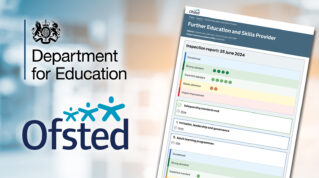The government has asked Ofsted to carry out research into the use of artificial intelligence (AI) in schools and colleges.
The review will look at how education settings are already using AI, and potential uses the technology could have for the sector.
Ministers have previously expressed hopes AI could help “transform” teacher workloads.
Outlining the remit of the review on Tuesday, Ofsted said it “will investigate how schools and further education (FE) colleges are using AI to support teaching and learning and to manage administrative systems and processes.
“We will look at the role leaders are playing in embedding AI and managing risks associated with AI use.
“We will collect data from schools and FE colleges as well as from academic literature and expert interviews. This will allow us to see how AI is already used and help us consider its potential uses and benefits.”
‘Intended and unintended impacts’
It will also look at how schools and colleges are monitoring the “intended and unintended impacts” of AI and governing its use, and “managing risks associated with AI use”
An Ofcom survey last year found Snapchat’s chatbot My AI was being used by 72 per cent of 13 to 17-year-olds.
The rise in young people using AI has sparked concerns over it being used by pupils to cheat when doing homework or coursework.
The Ofsted review aims to educate policymakers and education providers about the benefits and challenges of AI in education, and identify training Ofsted inspectors may need to help increase their understanding of AI and how it is being used.
The report will collect evidence from up to 20 schools and colleges, deemed “early adopters” of AI. Ofsted will interview leaders responsible for rolling out the use of AI at these schools and colleges.
The report will also look at existing research, and consult international inspectorates and academics with knowledge of AI use in education.
Evidence will be collected in Spring, and Ofsted says it hopes to publish its findings next summer.
‘Imperative’ exams are marked by humans
It comes as Sir Ian Bauckham, the government’s pick for Ofqual chief regulator, warned MPs that although there were some potential “exciting uses” for AI in generating exam questions, it was “imperative that a human oversees the marking of student work”.
“AI still makes mistakes. It hallucinates,” said Bauckham, who has served as interim chief regulator since January.

“Decisions made by AI evaluating a piece of work that a student has produced for a high stakes assessment are less transparent and therefore less open to challenge than they might be if marked by a human.”
Ofqual has “carefully sampled public confidence and attitudes in this space and…the public overwhelmingly wants a human being to oversee the marking of students work”.
But AI can be used for other purposes – for example “for the quality assurance of the examining process”.
“It can sample, it can check… There are lots and lots of useful, helpful, quality-improving things AI can do, but marking work itself must be overseen by a human being.”
But ‘exciting uses’ in question generation
Generating question papers which are roughly the same level of difficulty each year is “labour intensive” and “difficult”, Bauckham said.
“It may well be that AI can support with that, and my judgment would be that there are fewer risks to public confidence there, providing a human is in the loop for final sign-off, than in the actual marking of student work.”
The former school leader, who appeared at the education committee for his pre-appointment hearing, said the “vast majority” of GCSE and A-level assessments involved “some degree of extended writing”, which would need to be marked by humans.
However, he acknowledged “there may be some very simple, selective response items, so multiple choice questions, which can be safely marked by a machine, but we would still expect a human to be in the loop, checking that that is happening, sampling quality and so on”.
He added it was “very difficult to challenge a machine’s decision”.















AI shows great potential, and could potentially help with workload, although the time freed up by AI will be probably be swallowed up by another aspect of the job. This review should have a focus on how coursework is delivered in an AI age, the traditional way of coursework now has so many ways student can gain an advantage with AI it is no longer a fair assessment of student understanding.
Hopefully a review will explore perceptions around potential double standards.
Encouraging teachers / tutors to use it to be more productive, but discouraging students from using it because of concerns over cheating.